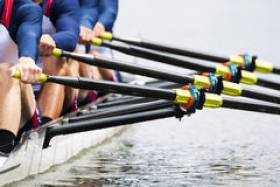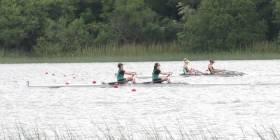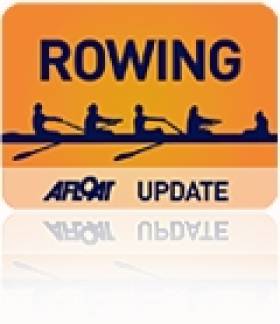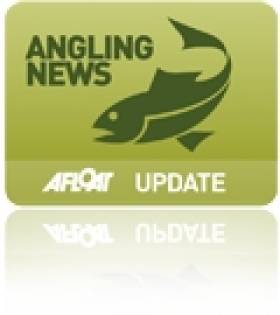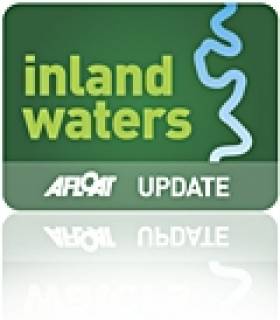Displaying items by tag: Lough Rynn
Lough Rynn Regatta Cancelled due to Weather Forecast
#Rowing: The organisers of Lough Rynn Regatta, set for Saturday, have cancelled the event. As Thursday went on the weather forecasts suggested that the mean speed of the win would be over 20 kilometres per hour with gusts which could make rowing on some parts of the course unsafe.
John Walsh, the regatta secretary, sent out a statement which said:
It is with huge regret and a heavy heart that the committee of Lough Rynn Regatta communicates this press release to inform the clubs that the Regatta for 2018 scheduled for 5th May 2018 has been cancelled due to the forecasted wind and wind gusts that are promised tomorrow during the middle of the day.
In the interest of athlete and volunteer safety we have made this decision in as timely a manner as possible. We gave the forecast every chance to improve once it deterioated yesterday afternoon and have even debated which forecast is the best to use. To be fair to all of the 41 clubs and 443 crews that were due to compete on the day and that were to due to travel from all over the country this decision is now being communicated in line with the initial announcement last night.
We would sincerely like to thank each and every one of the clubs, athletes and coaches who entered in such large numbers and to our army of volunteers who had set aside their day for the hosting of a successful regatta. Included in our volunteer rota was Mr. Eamonn Colclough, President of Rowing Ireland and Ms Michelle Carpenter the newly appointed CEO of Rowing Ireland. All our volunteers who have worked tirelessly over the past number of weeks are all equally devasted but safety comes first in this instance.
We will review the rowing calendar and hopefully will be back later in the year with an alternative event / date.
Thank you all for your continued support.
Yours in rowing
John Walsh
Regatta Secretary
New September Event Presages Big Change in Irish Rowing
#Rowing: Rowing Ireland is set to add a new event to the calendar in September, the forerunner of a major calendar change. The new regatta, which will be incorporated into the Irish Open in September, will be for young rowers. It will become an anuual event, and grow each year until it incorporates competition for under-20 and under-22 rowers. Pat McInerney, who presented the proposal to the fixtures meeting ahead of the Rowing Ireland agm in Dublin today, agreed that it might, in time advance the case of holding the Irish Championships in September.
Antonio Maurogiovanni, the Ireland high performance director, flew in from the Ireland training camp for the fixtures meeting and agm. He was fully in favour of the new regatta and wished to see the Irish Championships move to September. Patrick Boomer, Andy Harrington, Ronan Byrne and Conor Egan have joined the Ireland camp in Varese.
A major change in the calendar for 2019 sees Skibbereen Regatta and Lough Rynn switch positions. Lough Rynn is now pencilled in for Sunday, April 14th, a day after a combined University and Schools Championships, while Skibbereen would run on May 4th and 5th. Trinity switched to May 11th and Portadown to May 4th.
Awards at Rowing Ireland AGM:
President’s: Gerry Cantan. Leinster: Kathryn Wall. Munster: Teresita O’Callaghan. Connacht: Micheal O Marcachain. Ulster: Ronald Walker (2018). Shane Kernan (2017).
Tribesmen Off and St Michael's Moves Because of Weather
#Rowing: The Tribesmen Head of the River, set for Lough Rynn on Saturday (February 10th) has had to be called off because of a forecast of rain and gale force gusts of wind. The organisers hope to hold a deferred event in March.
The weather has caused a change in venue for another event. Flooding at O’Brien’s Bridge has forced the organisers of the St Michael’s Head of the River on February 24th to move it to the St Michael’s club on O’Callaghan’s Strand in Limerick.
#Rowing: NUIG carried off the men’s and women’s senior eights at the Lough Rynn Regatta in Leitrim today. Enniskillen, the former Portora, won the men’s and women’s junior 18 titles. While the morning session had run off on time and with little disruption, the weather changed for the worse in the afternoon, with squalls and bouts of heavy rain. The programme ran late and junior 15 and junior 16 events were cancelled.
A composite crew from UCC and Shandon won the men’s senior double, while the Three Castles duo of Rory Quinn and Oisin Clune of Three Castles won the junior double.
Lough Rynn Regatta, Leitrim (Selected Results)
Men
Eight – Senior: 1 NUIG, 2 UCD. Intermediate: 1 UCD, 2 Commercial, 3 NUIG A. Jun 18: 1 Enniskillen, 2 Neptune, 3 Commercial. Club/Jun 16: NUIG. Masters: Athlone (f).
Four – Senior: 1 NUIG, 2 Enniskillen, Cork. Inter, coxed: 1 NUIG A, 2 Commercial, 3 Skibbereen. Club, coxed: 1 NUIG A, 2 NUIG B, 3 Enniskillen. Junior, coxed: 1 Enniskillen, 2 Methodist, 3 Commercial. Masters, coxed: Neptune A (e).
Pair – Inter: 1 Commercial A, 2 St Michael’s, 3 Belfast BC. Jun 18: 1 Commercial B, 2 Commercial A, 3 Commercial C.
Sculling, Quadruple – Club, coxed: 1 Carlow, 2 Enniskillen, 3 Col Iognaid. Jun 16, coxed: 1 Castleconnell. Sculling, Masters: City of Derry.
Double – Sen: 1 Shandon/UCC, 2 Castleconnell, 3 Shandon. Jun 18: 1 Three Castles A, 2 Castleconnell B. Club: 1 Portadown, 2 Clonmel, 3 St Joseph’s. Jun 16: Three Castles.
Single – Sen: 1 Skibbereen (K Mannix), 2 Skibbereen (J Lupton) 3 UCC (R Byrne). Intermediate: 1 Skibbereen (Mannix), 2 Carlow (Murphy), 3 Shandon (O’Sullivan). Masters b and c: Galway (Walkowiak); c: Clonmel (McGrath); d: Carlow (O’Brien): e: Galway (D Crowley); g and h: Belfast BC (Lockwood).
Women
Eight – Sen: 1 NUIG, 2 Commercial. Inter: 1 NUIG, 2 NUIG B. Nov: 1 Galway, 2 Enniskillen. Club: 1 NUIG A, 2 NUIG B. Jun 18: 1 Enniskillen, 2 Bann, 3 Col Iognaid. Jun 16: St Michael’s. Masters: Belfast BC (e). Jun 15: Enniskillen A.
Four – Sen: 1 Cork, 2 Commercial, 3 NUIG. Jun 18A:1 Enniskillen, 2 Commercial, 3 Col Iognaid. Inter, Club, Jun 16, coxed: NUIG (inter).
Pair – Senior/Inter: 1 Bann (inter), 2 Cork, 3 Belfast.
Sculling, Quadruple – Nov, coxed: 1 Neptune, 2 Galway, 3 King’s Hospital. Club, coxed: 1 Methodist, 2 King’s Hos, 3 Commercial. Jun 18: 1 Clonmel, 2 Belfast BC, Portadown, Bann (sen). 3 Comercial. Masters, coxed: Belfast BC. Jun 16: Castleconnell.
Double – Sen: 1 Neptune, 2 Carlow/Kenmare, 3 Garda/NUIG. Club: 1 Bann, 2 St Michael’s, 3 Carlow. Jun: 1 Castleconnell, 2 Commercial, 3 Portadown. Masters: Tribesmen A (d).
Single – Sen: 1 Cork (L Dilleen), 2 Skibbereen (L Heaphy), 3 Queen’s (O Blundell). Inter: 1 Bann (A O’Donovan), 2 Neptune (C Feerick), 3 Skibberee (L Heaphy). Jun 18: 1 Bann (H Scott), 2 Carlow (C Nolan), 3 Col Iognaid (Nic Dhonncha). Masters: City of Derry (M Nic Bhloscaidh; a).
Feerick and Clarke Win With Fine Finish
#Rowing: Claire Feerick and Ava Clarke beat a Carlow-Kenmare composite in a tight finish of the women’s senior double at Lough Rynn Regatta today. The men’s four was also a tight race with NUIG beating a junior four which may represent Ireland at the Coupe de la Jeunesse.
Lisa Dilleen of Cork Boat Club won the women’s senior single sculls and Hannah Scott won the women’s junior 18 single. A re-row was called for the first two crews in the the men’s junior single. A launch stalled in the lane of Aaron Christie of Bann, who was in contention for first.
Tailwind conditions strengthened in late morning at the venue, but rowing continued on the impressive course.
Lough Rynn Regatta, Leitrim (Selected Results)
Men
Eight – Jun 15: Col Iognaid. Masters: Athlone (f).
Four – Senior: 1 NUIG, 2 Enniskillen, Cork. Inter, coxed: 1 NUIG A, 2 Commercial, 3 Skibbereen. Club, coxed: 1 NUIG A, 2 NUIG B, 3 Enniskillen.
Pair – Jun 18: 1 Commercial B, 2 Commercial A, 3 Commercial C.
Sculling, Quadruple – Jun 16, coxed: 1 Castleconnell.
Sculling, Quadruple – Club, coxed: 1 Carlow, 2 Enniskillen, 3 Col Iognaid.
Double – Jun 16: Three Castles.
Single – Intermediate: 1 Skibbereen (Mannix), 2 Carlow (Murphy), 3 Shandon (O’Sullivan).
Women
Eight – Jun 16: St Michael’s. Masters: Belfast BC (e). Jun 15: Enniskillen A.
Four – Sen: 1 Cork, 2 Commercial, 3 NUIG. Inter, Club, Jun 16, coxed: NUIG (inter).
Sculling, Quadruple – Nov, coxed: 1 Neptune, 2 Galway, 3 King’s Hospital. Club, coxed: 1 Methodist, 2 King’s Hos, 3 Commercial. Jun 18: 1 Clonmel, 2 Belfast BC, Portadown, Bann (sen). 3 Comercial.
Double – Sen: 1 Neptune, 2 Carlow/Kenmare, 3 Garda/NUIG. Club: 1 Bann, 2 St Michael’s, 3 Carlow. Jun: 1 Castleconnell, 2 Commercial, 3 Portadown. Masters: Tribesmen A (d).
Single – Sen: 1 Cork (L Dilleen), 2 Skibbereen (L Heaphy), 3 Queen’s (O Blundell). Inter: 1 Bann (A O’Donovan), 2 Neptune (C Feerick), 3 Skibberee (L Heaphy). Jun 18: 1 Bann (H Scott), 2 Carlow (C Nolan), 3 Col Iognaid (Nic Dhonncha).
New Rowing Course to be Built by Fermanagh and Hungarian Firms
#RowingCourse: Deane Public Works from Fermanagh will be awarded the main construction contract for the new rowing course at Lough Rynn in County Leitrim. The specialist work of design, supply and installation of the lanes will sub-contracted to Polaritas, a company from Budapest in Hungary. According to Leitrim County Council, the company have worked on the rowing courses for the 2008 and 2012 Olympic Games and will work on the installation of the rowing course for the Olympic Games in Rio de Janeiro in 2016.
The design/build contract for Lough Rynn involves the design, supply and installation of an eight-lane Albano Rowing Course to meet FISA (Fédération Internationale des Sociétés d’Aviron) Standards. The course will also be adjustable to meet canoe sprint competition rules of the International Canoe Federation.
The course may be finished by the end of this year.
Leitrim Gets Funding for Angling Tourism
Funding of more than €200,000 has been announced for new facilities at Lough Rynn in the hopes of bringing a major angling tourism boost to Co Leitrim.
The funding, allocated by Fáilte Ireland and announced by Roscommon/South Leitrim TD Frank Feighan, will provide new fishing pontoons on the lake, as well as a new rowing facility and upgrades to the existing caravan and camping site.
“I’m delighted to confirm this new funding, which will help to make our county even more attractive to tourists," said Depty Feighan. "Co Leitrim is already popular with visiting anglers but we are only just tapping into the potential. These new facilities will help to put us more firmly on the map."
The Leitrim Observer has more on the story HERE.
New Wheelyboat Makes Lough Rynn More Accessible
Leitrim Guardian Person of the Year Brendan Harvey was on hand to launch Lough Rynn's new Wheelyboat last weekend, the Leitrim Observer reports.
The boat is specially designed to meet the needs of people with disabilities in the area, giving them greater access to Leitrim's lakes and inland waterways for fishing or pleasure trips.
Built in England by registered charity the Wheelyboat Trust, the project was initiatied the Leitrim Association of People with Disabilities (LAPWD), with help from the Rinn-Shannon Agling Club.
The boat, named Ernest's Pride, is so called in tribute to Ernest Catherines, a "driving force" behind the scheme who passed away last month.



























